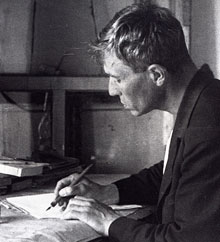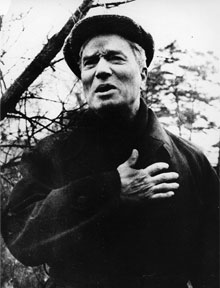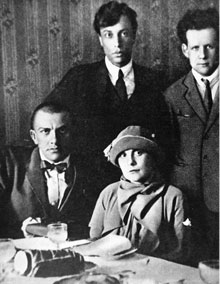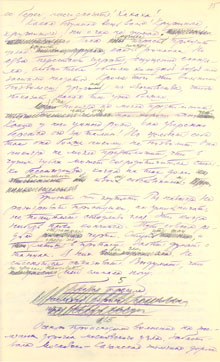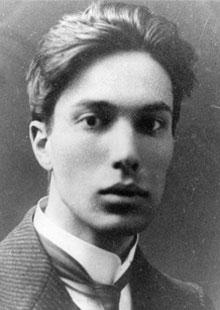EVERYMAN CLASSICS BORIS PASTERNAK Biography & Authors Voice
Boris Pasternak (1890-1960), Russian poet, author of Doctor Zhivago, and winner of the Nobel Prize for Literature in 1958.
The son of the artist Leonid Pasternak and his pianist wife, Rosalia Kaufman, Boris was brought up in an environment saturated in art and music. Among the family's frequent guests were Tolstoy and Scriabin, formative influences on Boris's early ambitions, initially as a composer, and later a writer.
Boris Pasternak's poetry is notable for its musicality. It is markedly rhythmic, rich in rhyme and assonance. His imagery is idiosyncratic and vividly impressionistic. His reputation was first established by the poetry collection, My Sister Life, published in 1922, the annus mirabilis of Modernism.
Pasternak's life and art encompass the turbulent years of the dying Russian empire, its revolutions, civil war, and Stalinism. His work is at once epic in range and autobiographical at heart, conveying his times with uncompromising honesty and lyric intensity.
EVERYMAN CLASSICS BORIS PASTERNAK Chronology
| 1890 | Boris Pasternak born. |
| 1893 | Marxist Russian Social Democratic Party holds its first party Congress. |
| 1903 | Meets Scriabin and begins studying musical composition. |
| 1905 | First Russian revolution. Pasternak family leaves for Berlin |
| 1906 | Family returns to Moscow. |
| 1908-13 | At Moscow University, first studying law, then philosophy. |
| 1910 | Death of Tolstoy. Leonid Pasternak, accompanied by Boris, is summoned to Astapovo by Tolstoy's widow to draw him on his death bed. First surviving poems and prose. |
| 1912 | Studying philosophy at Marburg University. |
| 1913 | First book of poems, 'Twin in the Clouds', published. |
| 1914 | Meets Mayakovsky. |
| 1916 | Working in the Urals. Verse collection, 'Over the Barriers', published |
| 1917 | February Revolution; Provisional Government formed; Tsar Nicolas II abdicates. March: Returns to Moscow; working on verse collection 'My Sister Life'. October Revolution; capture of Winter Palace and fall of Provisional Government; Lenin first chair of Sovnarkom. December: Civil war begins. |
| 1918 | Red Army established by Sovnarkom; Treaty of Brest-Litovsk ends Russia's participation in World War I. July: assassination of Tsar and his family. Translating Kleist and composing the verse collection 'Themes and Variations'. |
| 1921 | Russian famine; New Economic Policy. Meets his future wife Evgenia Lourie; his parents and sisters leave for Germany. |
| 1922 | Creation of the USSR. Marries. 'My Sister Life' (poems) and 'Luvers' Childhood' (prose) published. With his wife, joins family in Berlin. |
| 1923 | 'Themes and Variations' (poems) published. They return to Moscow; Boris will never see his parents again. His son Evgeny born. |
| 1924 | Lenin dies. 1st Party Congress led by Stalin, Zinoviev and Kamenev. |
| 1925 | Trotsky forced to resign. 14th Party Congress endorses leadership of Stalin and Bukharin. United Opposition of Kamenev and Zinoviev defeated. |
| 1926 | Trotsky expelled from Politburo. Wife Evgenia and son spend 5 months with his parents in Germany. |
| 1927 | Trotsky, Zinoviev and remaining members of United Opposition Party expelled from the Communist Party. 'The Year 1905' (autobiographical poem) published. |
| 1928 | Stalin's 1st 5-Year Plan. |
| 1929 | 'The Last Summer' (novella) and "Over the Barriers' (poems) published. |
| 1930 | 'GULAG' (government agency directing penal labour camps) officially created. Suicide of Mayakovsky. Refused permission to visit his parents in Germany. He leaves his wife and son. |
| 1931 | 'Spektorsky' (novel) published. Travels to Georgia with Zinaida Neuhaus, later his second wife. 'Safe Conduct' (autobiography) published. |
| 1932 | 'Second Birth' (poems) published. |
| 1933 | One-volume collection of 'Poems' published. |
| 1934 | Arrest of Mandelstam. Intercedes with Bukharin. Receives telephone call from Stalin. Speaks at Writers' Congress. |
| 1935 | Sent to Anti-Fascist Conference in Paris, visits London. Punin (Futurist critic and husband of Anna Akhmatova) and L Gumilev (son of poets N Gumilyev and Akhmatova) arrested; successfully intercedes with Stalin on their behalf. |
| 1936 | Stalin Constitution established. In 1st Moscow Show 'Trial of Sixteen' all are executed. Speaks at 3rd Plenary meeting of Writers' Union. Is allocated dacha in writers' village of Peredelkino. |
| 1937 | January: 2nd Show trial (13/17 defendants executed). June: Secret Trial and execution of Tukhachevsky and Red Army generals. Refuses to sign petition for their execution. July: Great Purge begins. NKVD Orders No 00447 and 00486 set nationwide quotas for execution and enslavement of 'anti-Soviet elements' and condemn relatives of accused to labour camps. Of Boris' friends, the Georgian poets Paolo Yashvili commits suicide and Tristan Tabidze is executed; the writer Pilnyak is arrested and dies in custody. |
| 1938 | 3rd Show 'Trial of the Twenty-One'; Bukharin and all 20 co-defendants executed. Conservative estimates judge c. 1,000 victims a day, totaling some 1.2 million, were executed in the Great Purge of 1937-8. Leonid, son by his 2nd wife, born. Translating poems by Shakespeare and others. Parents and sisters flee Nazi Germany for England. |
| 1939 | Molotov-Ribbentrop Pact. Soviet invasion of Poland. Commissioned by director Meyerhold to translate 'Hamlet'. Marina Tsvetayeva (poet and friend) returns from exile in the West. Meyerhold arrested (executed 1940); his wife assassinated; Tsvetayeva's daughter arrested, her husband arrested and later shot. Boris's mother dies in London. |
| 1940 | Katyn Massacre: 27,500 imprisoned Polish Nationalists executed. Soviet Peace Treaty with Finland. Translation of 'Hamlet' and 'Selected Translations' (poetry) published. |
| 1941 | Operation Barbarossa – 3 million Axis soldiers invade USSR. September 1941-January 1944, Siege of Leningrad. October, Battle for Moscow. Evacuations from Moscow include Boris's wives and sons, Boris, and Tsvetayeva who commits suicide. Translating 'Romeo & Juliet'. |
| 1942-3 | Battle of Stalingrad. Translating 'Antony & Cleopatra'. |
| 1943 | 'On Early Trains' (poems) published. Boris and wife Zinaida return to Moscow. |
| 1944 | Translations of 'Romeo & Juliet' and 'Antony & Cleopatra' published; begins work on 'Othello'. |
| 1945 | Translating Shakespeare's '1-2 Henry IV'. 'Othello', 'Earth's Expanse' (poems) and 'Collected Poems' published. Father dies in England. Begins work on 'Doctor Zhivago'. |
| 1946 | Akhmatova ans Zoshchenko (satirist) accused of bourgeois individualism by Central Committee of Communist Party. Boris included in a critical speech by Fadeyev, Secretary of Writers' Union. His acquaintance with Olga Ivinskaya begins. |
| 1947 | Translating 'King Lear'. |
| 1948 | Selected Works' pulped by the authorities. Some typed copies of 'Doctor Zhivago', Part I, circulated among Russian friends. |
| 1949 | 2-volume edition of Shakespeare translations published. Ivinskaya arrested. |
| 1950 | Translation of Goethe's 'Selected Works' published. Translates 'Macbeth'. |
| 1953 | Death of Stalin. Ivinskaya released in amnesty. First draft of 'Doctor Zhivago' completed. Translation of Goethe's 'Faust' published. |
| 1956 | Kruschev's speech at the 20th Party Conference attacks Stalin's Purges and the Personality Cult. Typescript of 'Doctor Zhivago' delivered to the Russian press, and his collected poems prepared for publication. In September the journal 'Novy Mir' refuses publication of 'Doctor Zhivago'. |
| 1957 | Contract signed for publication of 'Doctor Zhivago' by 'Khudozhestvennaya Literatura'. November, Italian translation of 'Doctor Zhivago' published in Milan by Feltrinelli, who smuggled the manuscript out of the Soviet Union. |
| 1958 | Translations of 'Doctor Zhivago' published in France, England and Germany. 23 October, Pasternak awarded Nobel Prize for Literature; telegraphs acceptance. 23-5 October, vilified in Soviet press; 27 October, expelled from the Writers' Union; 29 October, declines the Nobel Prize. |
| 1959 | Summoned by Public Prosecutor and accused of treason. Begins his play, 'The Blind Beauty', and translates Calderon's 'Constant Prince'. |
| 1960 | Dies of cancer three months after his 70th birthday. |











